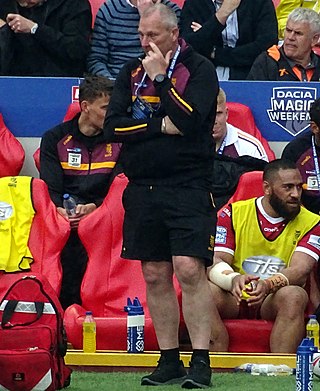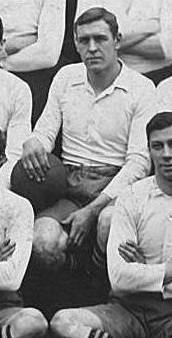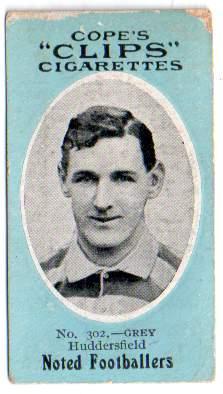Related Research Articles
Stephen Norton, also known by the nickname of "Knocker", is an English former professional rugby league footballer who played in the 1970s and 1980s, and coached in the 1990s. He played at representative level for Great Britain, England and Yorkshire, and at club level for Fryston ARLFC, Castleford, Hull FC and Wakefield Trinity, as a second-row or loose forward, and coached at club level for Barrow.
Alan Burwell is an English former professional rugby league footballer who played in the 1960s and 1970s. He played at representative level for Great Britain, Great Britain (Under-24s) and Yorkshire, and at club level for Hull Kingston Rovers and Canterbury-Bankstown (captain), as a wing, centre, stand-off or scrum-half.
Kevin Dick, also known by the nickname of "Iron Teddy Bear", is an English former professional rugby league footballer who played in the 1970s, 1980s and 1990s. He played at representative level for Great Britain, and at club level for Leeds, Hull FC, Halifax and Huddersfield, as a goal-kicking scrum-half.
George Fairbairn is a Scottish former rugby union and professional rugby league footballer who played in the 1970s and 1980s, and coached rugby league in the 1980s and 1990s. He played representative level rugby union (RU) for Borders, and at club level for Kelso RFC, and representative level rugby league (RL) for Great Britain and England, and at club level for Wigan, winning the Man of Steel Award in 1980, and Hull Kingston Rovers, as a goal-kicking fullback, and coached at representative level rugby league for Scotland, and at club level Wigan, Hull Kingston Rovers, and Huddersfield.

Andy Kelly, also known by the nicknames of "Boot", and "Big Andy", is an English former professional rugby league footballer who played in the 1980s and 1990s, and coached in the 1990s, 2000s and 2010s. He played at representative level for England, and at club level for Wakefield Trinity (captain), Hull Kingston Rovers and the Illawarra Steelers, as a second-row, and has coached at representative level for Ireland, and at club level for Wakefield Trinity/Wakefield Trinity Wildcats, Gateshead Thunder, Featherstone Rovers and the Dewsbury Rams.
Adam Hughes is an English former professional rugby league and rugby union footballer who played in the 1990s and 2000s. He played representative rugby league (RL) for Wales, and at club level for Milford ARLFC, in Leeds, the Leeds Rhinos, the Wakefield Trinity (Wildcats), Halifax, the Widnes Vikings, the Leigh Centurions, Oldham, and the Barrow Raiders, as a centre or wing, and club level rugby union (RU) for Leeds Tykes.
Philip "Phil" G. Hogan is an English sports therapist, and former professional rugby league footballer who played in the 1970s, 1980s and 1990s. He played at representative level for Great Britain and England, and at club level for Holker Pioneers ARLFC, Barrow and Hull Kingston Rovers as a second-row or loose forward. Followong retirement from rugby Phil started his own gym in his local town before later moving into coaching at local rugby union club Furness Rugby Club. Whilst coaching Phil helped develop many local rugby talents that went on to represent the county including players such as Philip Brockbank and Corne Els.
John Holmes was an English professional rugby league footballer.
Leslie Sheard is an English former rugby union and professional rugby league footballer who played in the 1970s and 1980s, and coached rugby league in the 1980s. He played club level rugby union (RU) for Wakefield RFC, and representative level rugby league (RL) for England and Yorkshire, and at club level for Castleford, Wakefield Trinity, York (captain), and Huddersfield, as a fullback or centre, and coached club level rugby league for Huddersfield.
Len Casey, also known by the nickname of "Cast Iron Casey", is an English former professional rugby league footballer who played in the 1960s, 1970s and 1980s, and coached in the 1980s and 1990s. He played at representative level for Great Britain and England, and at club level for Hull Kingston Rovers, Bradford Northern, Hull F.C. and Wakefield Trinity, as a prop, second-row or loose forward, and coached at club level for Wakefield Trinity, Hull FC, Beverley A.R.L.F.C. and the Scarborough Pirates.
Gerald Dunn was an English rugby union, and professional rugby league footballer, who played in the 1960s, 1970s and 1980s. He coached rugby league in the 1980s and 1990s. Dunn played rugby union for Redcar RUFC, and representative level rugby league for England and Yorkshire, and at club level for Hull Kingston Rovers, as a wing or centre, and coached rugby league for Hull Kingston Rovers.
Paul Rose is an English former professional rugby league footballer who played in the 1960s, 1970s and 1980s. He played at representative level for Great Britain, England and Yorkshire, and at club level for Hull Kingston Rovers, the Dapto Canaries and Hull FC, as a prop or second-row.

Benjamin Gronow was a Welsh dual-code international rugby union, and professional rugby league footballer who played in the 1900s, 1910s and 1920s. At club level Gronow played under the union code for Bridgend RFC, county rugby for Glamorgan, and international rugby for Wales. He was often used as a utility forward. When he switched to professional league rugby he represented Huddersfield, Grenfell, Batley and Featherstone Rovers (captain), while at representative level, Gronow played for Great Britain and Wales. His playing position varied under the league code being used as a goal-kicking forward.
Philip Thomas was a Welsh rugby union and professional rugby league footballer who played in the 1900s and 1910s. He played club level rugby union (RU) for Tredegar RFC, and representative level rugby league (RL) for Great Britain, Wales and Yorkshire, and at club level for Oldham, Leeds, Hull Kingston Rovers and Harrogate ARLFC, as a centre.

John Henry Rogers was a Welsh rugby union and professional rugby league footballer who played in the 1900s, 1910s and 1920s. He played club level rugby union (RU) for Bridgend RFC and Cardiff RFC, initially as a wing and later as a scrum-half and representative level rugby league (RL) for Great Britain, Wales and Other Nationalities, and at club level for Huddersfield and Wakefield Trinity, as a wing, stand-off, or scrum-half.

Anthony Starks was an English dual-code international rugby union, and professional rugby league footballer who played in the 1890s and 1900s. He played representative level rugby union (RU) for England and Yorkshire, and at club level for Castleford RUFC, as a forward, and representative level rugby league (RL) for England and Yorkshire, and at club level for Hull Kingston Rovers (captain), as a forward. England's Anthony Starks, and Wales' Jack Rhapps took the field in the inaugural rugby league international of Tuesday 5 April 1904 between England and Other Nationalities. Starks had made two rugby union Test appearances for England in 1896, and Rhapps had made a single rugby union Test appearance for Wales in 1897, and thus in April 1904 they became the world's first dual-code rugby internationals.

John Christopher Walkington was an English rugby union, and professional rugby league footballer who played in the 1920s, 1930s and 1940s. He played club level rugby union (RU) for Burley RUFC, and representative level rugby league (RL) for England, and at club level for Hunslet (captain), and Batley, as a fullback.
Terence "Terry" A. Clawson was an English World Cup winning professional rugby league footballer who played from the 1950s through to the 1980s. He played at representative level for Great Britain between 1962 and 1974, and was part of the 1972 Rugby League World Cup winning squad. He also played for Yorkshire, and at club level for Featherstone Rovers (captain), Bradford Northern, Leeds, Hull Kingston Rovers, Oldham, York, Wakefield Trinity, Hull F.C. and South Newcastle, as a goal-kicking prop or second-row. He coached at club level for South Newcastle and Featherstone Rovers.

Glyndwr Turner is a Welsh former rugby union footballer who played scrum-half position for Welsh club side Ebbw Vale RFC between 1966 and 1974 before turning professional to play rugby league in England. On turning professional, Turner signed for Hull Kingston Rovers in 1974 playing for them until 1978, before moving to rivals Hull FC in 1978 where he played until he was forced to retire in 1980 due to injury, as a centre or stand-off.

Thomas H. Grey was a Welsh rugby union and professional rugby league footballer who played in the 1900s and 1910s. He played club level rugby union (RU) for Swansea RFC, as a halfback, and representative level rugby league (RL) for Wales, and at club level for Halifax and Huddersfield, as a stand-off or scrum-half.
References
- 1 2 3 "Statistics at rugbyleagueproject.org". rugbyleagueproject.org. 31 December 2017. Retrieved 1 January 2018.
- ↑ "Player Summary: Dick Wallace". Rugby League Records. Rugby League Record Keepers Club. Retrieved 26 November 2024.
- ↑ Williams, Graham; Lush, Peter; Farrar, David (2009). The British Rugby League Records Book. London League. pp. 108–114. ISBN 978-1-903659-49-6.
- 1 2 3 Gronow, David (2008). 100 Greats: Huddersfield Rugby League Football Club. Stroud: Stadia. p. 123. ISBN 978-0-7524-4584-7.